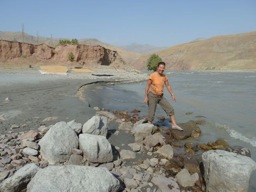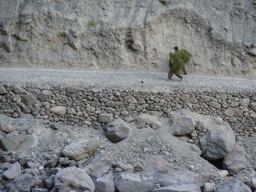We bump at 15mph along the stony road, a brown cliff rising steeply to our left, the great roiling mass of the Oxus (now called the Panj) following to our right.
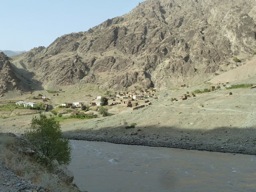
The river’s turbulent slate-grey waters move in the opposite direction from us, and far more swiftly than we can. We are in Tajikistan. If my pitching arm were any good, I could say we were a stone’s throw away from Afghanistan, which claims the other bank of the Oxus for its own.
Hour after hour, for hundreds of miles, while Bernard maneuvers Brunhilde along the torturous road, I follow the marvel of a patch scratched into the Afghan side. Wide enough for 2 people to walk abreast, for a donkey to carry a reasonable load, in some sections even for a motorbike to proceed with caution, it connects isolated brown mud villages, now green with tall corn, broad fanning trees and bright fields. I see flat roofs piled high with hay for the winter. A small herd of black and brown cows step tentatively down the steep grey sand bank for a drink. Even here satellite dishes polka dot the village scape.
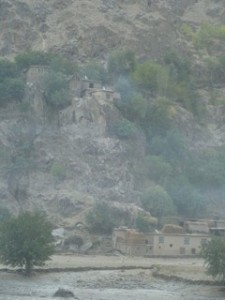
The track brooks no obstacle. It runs at roughly the same line of contour regardless of whether it is a pearl grey path or an acrobat’s delight etched into the side of an orange cliff. A gap over a small cascade is spanned by a short stretch of wood plank bridge. In some steep sections where the rock prohibited engraving a flat path, steps are carved, or dry laid with rock or patched together from wood.
We have driven east from Dushanbe, far inland, and when our road first joins the Tajik side of the river, the track is there. We stop across the river from an Afghan patrol post, a small building marked by their black, green and red national flag. In this place where nothing happens;, they notice us immediately. “Hallooooo,” we hear. We halloooo back, and wave both arms.
The track continues without a break and is there when a full ivory moon rises over the village of Qualaikhum, where we eat a plate of cucumber salad and roast chicken at a restaurant above an icy tributary that in any other place would be considered a sizeable river, but here is a mere thread to the sinuous rope that is the Oxus. That night we sleep at a simple but clean hostel built for travelers by the Aga Khan Foundation.
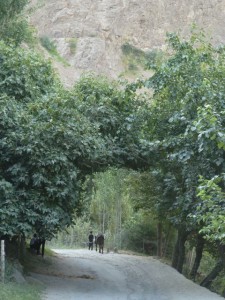
The track is a constant, never failing me for the 500 kilometers we have driven across from it, and it is there when we we reach our second night’s stop, a lovely inn with grape vines, terraced lawns and duvets on the bed. It’ll be there tomorrow, as we drive 60 miles south to Ishkashim, a border crossing between Tajikistan and Afghanistan.
As we drive, I see 2 men in flapping white trousers and shirts, with black vests and skull caps. One is turned toward the other, perhaps engrossed in conversation, as they move with ground-eating strides.
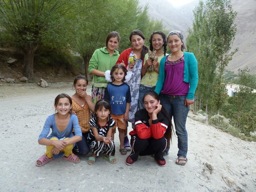
I see a small group of boys in black pants and whit shirts, some with backpacks, whose dawdling pace may indicate they’re on their way to or from school. I see two women in black with bright head scarfs ambling so slowly it’s clear they must relish the privacy the path can offer. If the racket Brunhilde makes managing the rocks potholes and jagged bits of old pavement weren’t so infernal, I’m sure the lilt of laughter would waft across the river, needing no visa.
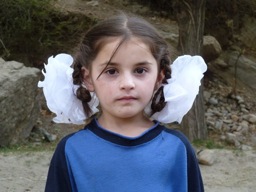
Through it all, for two days, the Oxus accepts the tributary devotions of countless rivers, their water so pure it sits at the merging point, a distinct glacial green that disdains mixing with the Oxus’ heavily silted grey brown. This mighty river convulses with mammoth rapids, that can only hint at the monstrous boulders that must lie on its bed. Over the ages, these have tumbled from peaks that rise 7800 sheet feet on all sides of us, brown to yellow to pale grey, impossibly barren and convoluted, to an altitude where snow hasn’t melted. The river is alive. It bunches and flexes, stretches and coils, like the veins and muscles of a well-oiled Mr. Universe. It proceeds thus for 1500 miles from its birthplace in the High Pamirs and what we have been privileged to see thus far is but a sliver of the whole.
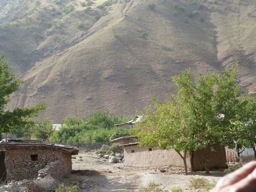
For us it has been a glorious two days on what must surely be the most remarkable road in the one of the most extraordinary places we have ever been. I thank goodness for Bernard’s driving skills and I thank goodness for Brunhilde, who has finally had a job to do after 6000 kilometers of asking “Why am I here?” The same cannot be said for some of the other cars, which simply aren’t made for the shattering grind of such a rough road, and whose drivers and navigators have thus faced hellishly long days along with various mechanical and parts failures that are a tremendous frustration. But tonight we will all be together in this lovely inn in Khorog, with a kitchen that promises good hot food and perhaps some reasonable red wine. And the assurance that the mighty Oxus will be flowing onwards outside our window.
-Dina









